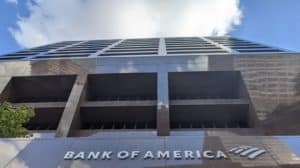Several of America’s biggest banks say they’re setting aside hundreds of millions of dollars each to cover potential loan losses in the event of a recession this year.
Bank of America’s fourth-quarter profits rose slightly from a year ago, as higher credit costs and potentially bad loans more than offset the bank’s sharp rise in interest revenue.
The Charlotte, North Carolina-based bank said Friday that it earned a profit of $7.13 billion, or 85 cents a share in the three months ended Dec. 31, compared to a profit of $7.01 billion, or 82 cents a share, in the same period a year earlier. The results were better than analysts’ forecast of a profit of roughly 77 cents per share, according to FactSet.
Like its major competitors, Bank of America saw a sharp rise in interest income, helped by the Federal Reserve aggressively raising interest rates last year to stop inflation. BofA’s interest revenue was roughly $3 billion higher than it was in 2021.
But also like JPMorgan Chase and others, BofA saw a slowdown in its investment banking business and had to set aside more money to cover potentially bad loans. The bank had $1.1 billion in credit reserves added this quarter; a year earlier, the bank released $500 million from that account.
Banks put money aside to cover potentially bad loans as their economists try to figure out where the U.S. and global economies are headed and use computer models to simulate how much in potential losses they may take in those scenarios. Most banks have predicted that there might be a recession this year as a result of the Fed’s rate hikes.
“We ended the year on a strong note growing earnings year over year in the [fourth] quarter in an increasingly slowing economic environment,” said Brian Moynihan, CEO and chairman of Bank of America, in a statement.
San Francisco-based Wells Fargo also set aside an additional $397 million for its loan loss reserves in preparation for a potential economic downturn, which many economists are predicting as the Federal Reserve continues its aggressive rate hikes and monetary policy tightening to try to bring down inflation.
“We are planning for it to get worse than it’s been the past few quarters,” said Mike Santomassimo, Wells’ chief financial officer.
JPMorgan Chase told investors Friday that it is now predicting a “mild” recession as part of its outlook. It set aside $1.4 billion to cover potentially bad loans, and incurred roughly $900 million in charge offs. The bank said it needed to set aside more to cover bad loans due to “a modest deterioration” in the firm’s economic outlook, which now calls for a “mild” recession.
“The U.S. economy currently remains strong with consumers still spending excess cash and businesses healthy,” Jamie Dimon, chairman and CEO of JPMorgan Chase, said in a statement. “However, we still do not know the ultimate effect of the headwinds coming from geopolitical tensions including the war in Ukraine, the vulnerable state of energy and food supplies, persistent inflation that is eroding purchasing power and has pushed interest rates higher, and the unprecedented quantitative tightening.”
The bank also said its fourth-quarter profits rose 6 percent from a year ago, as higher interest rates helped the bank make up for a slowdown in deal-making in its investment bank. The bank also set aside more than $2 billion to cover potential bad loans and charge-offs in preparation for a possible recession.
The New York-based bank said Friday that it earned $11.0 billion last quarter, up from $10.4 billion in the same period a year earlier. On a per-share basis, JPMorgan said it earned a profit of $3.57 a share compared to $3.33 a share in 2021, much better than the $3.08 a share that analysts were expecting.
The biggest driver of JPMorgan’s profits this quarter was higher interest rates. The bank, like its competition, have been helped considerably by the Federal Reserve hiking rates aggressively to combat inflation as banks can charge more for loans.
JPMorgan’s net interest income was $20.3 billion, up 48 percent from a year earlier.
Associated Press staff writer Matt Ott contributed to this story.




 |
| 


